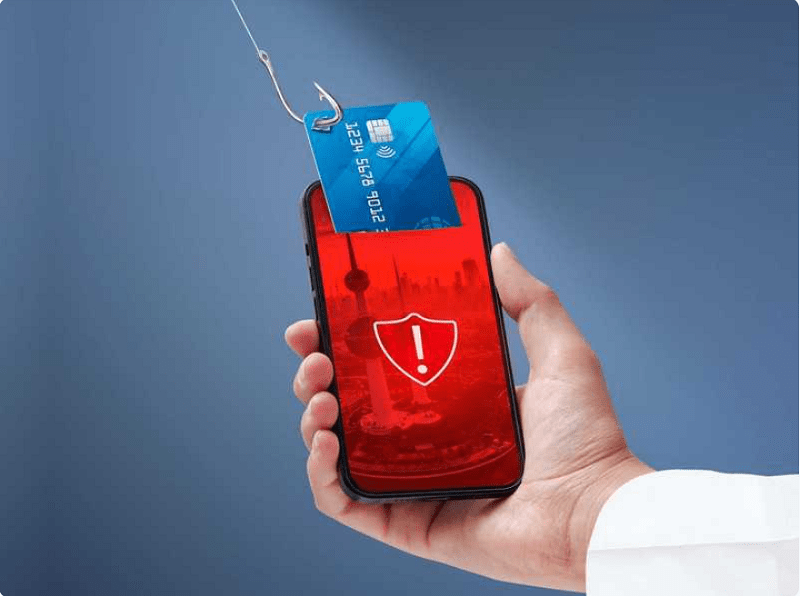After the Public Prosecution warned about electronic fraud and said it had received 300 complaints from the victims, technical experts warned of international gangs targeting Kuwaiti bank accounts, as well as the use of suspicious applications to hack personal data, and then blackmail their owners to obtain money.
The technicians explained that some gangs operating in Kuwait and abroad seek to cause the largest number of victims and use them to download a set of applications on their phones to steal their personal data, in addition to stealing credit card numbers, reports a local Arabic daily.
They pointed out that these gangs work with people of both sexes and contact citizens and residents to deceive them by deluding them into investing by providing them with fictitious investment, financial and marketing services, as well as deceiving them by claiming that they have won prizes.
They added: Despite the repeated warnings of the Ministry of Interior over the past month about remote access applications, victims are still falling every day until the total number of complaints received by the Public Prosecution exceeded 300 complaints pertaining to one application.
In parallel with the efforts of the Public Prosecution, the Ministry of Interior arrested 20 residents, men and women, who provided services that violate Kuwaiti laws and regulations and defrauded individuals through applications and social networking sites using international and encrypted numbers.
The head of the Kuwaiti Society for Information Security, Dr. Safa’a Zaman, said that the applications that rely on the remote access system are the ones against which the prosecution receives the most complaints, as these applications “allow people to enter remotely to the device for several reasons, including what companies use to provide assistance to customers remotely, and unfortunately recently, some of these telephone services have been used for bad purposes, which is accessing devices for the purpose of fraud.
Zaman went on to say, it is one of the most important advices to confront the dangers of such applications, “not to trust messages or calls from any party, whatever the reasons, and not to download any applications or click on links at the request of other people, whatever the reason.
She added, if a person feels any change or strange movement in the telephone, must promptly inform the competent authorities, and not give any person who does not know him/her any data that enables them to access the telephone equipment, regardless of the pretexts. She called on people not to share any details of logging into bank accounts via the Internet, or even to send passwords to anyone.
She indicated that in the event of any penetration, the telephone device must be immediately examined with anti-virus software or by an expert in this aspect, and the concerned authorities should be informed of the fraud, in addition to changing the data directly from different passwords and addresses, and informing the bank with which you deal and credit card institutions and others.
In addition, the daily monitored that a group of men and women obtained money through social networking sites, relying on activating fake accounts, suspicious invitations to users, and sending bank links as prizes through WhatsApp.
Some of these gangs also exploited the victims through smart applications based on the virtual network that supports the VPN encryption system, as users are required to purchase financial cards ranging from 14 to 200 dollars, depending on the type of services required.
Some scammers take advantage of citizens and residents through fake accounts and international phone numbers, where they communicate with the victim through “WhatsApp” and then invite them to buy materials in exchange for offers in local markets, which are often fake, in addition to options for purchasing digital currencies and investment, or calling to win prizes on condition of payment of a certain value, and accordingly, financial links bearing the names of local banks are sent, in order to defraud and steal phone data.
The Public Institution for Social Security (PIFSS) confirmed that it does not contact them through any affiliated companies to invite them to participate in investment projects.
The tripartite committee is working in cooperation with the Ministry of Interior and the Residence Affairs Investigation to monitor fraud networks, and a number of those involved in these suspicious electronic businesses have recently been deported.
During this month, the Ministry of Interior arrested 20 expatriates of different nationalities, who work in providing suspicious electronic services and businesses. They were found in possession of a set of surveillance and broadcast cameras, smart devices and computers, and they were referred to the deportation prison.
The Cybercrime Department at the Ministry of Interior called for not completing purchases through social media before “contacting the seller, verifying his credibility, and paying upon receipt for the goods.”

